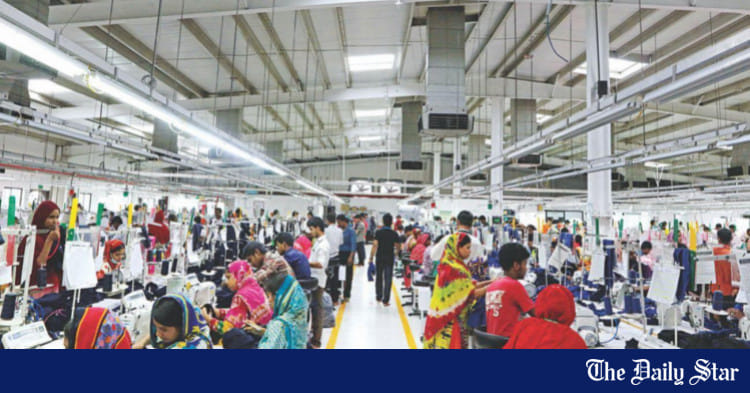Bangladesh fails to hook higher share of global RMG demand rise: report
Moinul Haque 23 April, 2024, 22:29
A file photo shows workers sewing clothes at a readymade garment factory at Savar, on the outskirts of Dhaka. Bangladesh has failed to capture a larger share of increased global demand for apparel in 2024 as China is outpacing Bangladesh in terms of receiving export orders, according to a Quality Inspection MAnagement report. | — New Age photo
Bangladesh has failed to capture a larger share of increased global demand for apparel in 2024 as China is outpacing Bangladesh in terms of receiving export orders, according to a Quality Inspection MAnagement report.
QIMA, a leading provider of supply chain compliance solutions, in its second quarter, 2024 barometer titled 'Q1 Procurement Uptick: a Beacon of Hope for Western Retail?' said that after a year of sluggish demand, the first quarter of 2024 witnessed a rise in sourcing volumes across the board, both in overseas supplier regions and nearshoring markets.
It showed that global demand for textile and apparel inspections and audits from garment manufacturing countries, including Bangladesh, increased over 20 per cent in the Q1 of 2024 while China was experiencing resurgence in popularity among apparel brands, its competitors in Asia and beyond were keeping pace.
According to the report, both United States- and European Union-based brands stepped up their procurement in Bangladesh, instilling optimism that the country's export sector would perform better this year compared with 2023, when a political crisis halted a significant portion of Bangladesh's manufacturing.
Citing a recent initiative of the government, QIMA expressed its doubt whether the optimism would pan out remains to be seen, as the industry has some concerns about the Bangladeshi government's policy move to reduce cash incentives for garment exports.
The recent data also reflected that Bangladesh's apparel exports have been witnessing deepest drop among its competitors, including China and Vietnam, in the US and the EU markets.
In 2023, QIMA data showed that much of China's growth was driven by emerging regions' demand, Q1 '24 saw the appetite for madein-China bouncing back in the West.
Demand for China inspections and audits among US-based buyers grew by 12 per cent year on year, while among European brands, the growth was even faster.
Especially from buyers based in Germany the growth was 35 per cent, France 30 per cent, and the Netherlands 33 per cent, the QIMA data showed.
'Meanwhile, interest in China's manufacturing capacities remained robust among buyers in other parts of Asia, as well as in Latin and South America, with double-digit growth in inspection and audit demand across the board,' the report said.
This barometer report, informed by QIMA's data on product inspections and factory audits, as well as its recent survey of more than 800 businesses, offers an early glimpse into the state of the sourcing landscape in 2024 and expectations for the upcoming months.
According to the survey, two-thirds of respondents globally reported plans to maintain or increase business volumes with Chinese suppliers in 2024.
It showed that 59 per cent of buyers in the US and 68 per cent of those based in the EU expressed similar intentions.
Former Bangladesh Knitwear Manufacturers and Exporters Association president Fazlul Hoque agreed with the findings of QIMA and said that Bangladesh was getting little benefits from the recent surge in global demand for the apparel due to the increasing production cost.
He said that China had desperately decreased the prices of products to gain the lion share of the increased demand for apparel on the global market.
'It is fact: Bangladesh is losing its competitiveness on the global market due to the increased production cost and our competitors, including China and Vietnam, grabbing more export orders,' BKMEA executive president Mohammad Hatem said.
He said that the excessive hike in prices of gas and electricity and recent increase of workers' wages affected the competitiveness of the sector.
Recent data from the US Department of Commerce's Office of Textiles and Apparel reveals that Bangladesh significantly lagged behind its competitors in apparel exports to the US market during the January-February period of 2024.
According to OTEXA data, Bangladesh's apparel exports to the US in January-February 2024 declined by 19.24 per cent, contrasting with China's export growth of 0.48 per cent and Vietnam's increase of 0.14 per cent in the same period.
Similarly, Eurostat, the statistical office of the European Union, showed that Bangladesh's apparel exports in January-February 2024 saw a decline of 26.74 per cent, in the 27-nation economic bloc, while the exports of China decreased by 13.12 per cent and Vietnam declined by 10.77 per cent in the period.











































